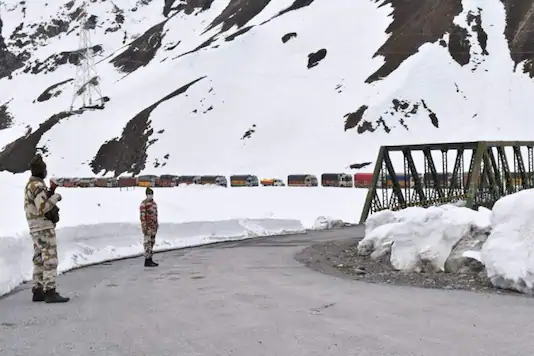
SOURCE: NEWS18
The Indo-Tibetian Border Police, at the vanguard of India’s defence along the Line of Actual Control with China, is staring at vacancies right at the top. As many as three ADG (Additional Director General) level posts in the force are vacant. There are 50 per cent vacancies at the level of inspector generals as appointments have been made for only 10 out of the sanctioned 20 IG posts so far.The Border Security Force, which guards the western border with Pakistan, is no better when it comes to recruitment at the IG level as 12 posts are lying vacant out of sanctioned strength of 45.
The two para military forces guarding the two flanks of the country also share a DG (Director General). SS Deswal has been handling the additional charge of DG BSF since March 2020.
The government has not appointed a full-time Director General of BSF for two months now. Deswal had been dividing his time between ITBP and BSF frontline posts but with the recent Indo-China border tension, the need for a full time DG is being felt even more.
Prakash Singh, former DG of BSF, said not appointing a full-time DG also impacts the morale of the force.
“Even under normal circumstances a force of 200 thousand plus would need a full time Director General. Why can’t you appoint a full-time one? You knew the retirement date of the incumbent. The officers from amongst whom you have to appoint are available, then what is the problem? Can you imagine the Army being kept headless?” Prakash Singh asked.
He added that both Pakistan and China are taking advantage of the coronavirus pandemic and vacancies at the top during such a time will only lower the morale of the jawans.
“The soldiers feel bad. ITBP is a full-time job. You always will be unable to give full attention to the force which has been given to you as additional charge,” he said.
The Appointment Committee of the Cabinet appoints the Director General of the force and the ADG-level officers while the IGs and DIGs are finalised by MHA constituted Departmental Promotion Committee (DPC).
Officials told CNN-News18 that DPC which usually meets in September-October to finalise recommendations by December 31 of each year has not met in 2019, thereby delaying promotions and appointments at DIG and IG levels.
Paramilitary officials told CNN-News18 that the cadre review of the CAPF (Central Armed Police Forces) and the OGAS (organised group A service) matter has compounded vacancy related problems. In ITBP for example, pre-2019 there were 10 IG posts. Cadre review doubled the posts but recruitments did not happen. At the DIG level, only 55 of the 71 positions are filled.
In 2017, junior home minister Kiren Rijiju told the Lok Sabha that 16 per cent of total CAPF sanctioned strength was vacant. Since then vacancies have only gone up as IPS and cadre level officials have clashed in Supreme Court and the Delhi high court.
In 2019, the cadre officers of paramilitary forces moved Delhi HC arguing that all the newly created IG and DIG posts should be filled with cadre-level officers only and not by IPS officers. The court gave an injunction which means appointments are on hold till the matter is sub-judice.
A similar cadre vs IPS battle on the OGAS issue was also fought before the Supreme Court where the court ruled in favour of granting Organised Group A Service to CAPF cadre but the judgement failed to resolve the tug of war between cadre and IPS officers over senior positions in the force.
The cadre level officers of CAPF want the IG level posts to be filled exclusively by them while IPS officers say this is against recruitment rules. The Ministry of Home Affairs has failed to amicably resolve the issue.
In this fight, the force stares at leadership crisis, low morale and discipline related issues while the enemy is getting aggressive at the borders.
https://defencenewsofindia.com/shared-chief-vacancies-at-top-rung-weaken-bsf-itbp-as-pakistan-china-get-aggressive-on-borders/






